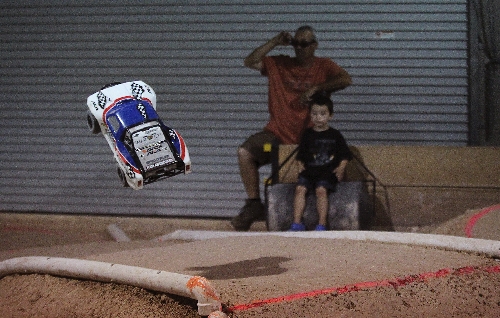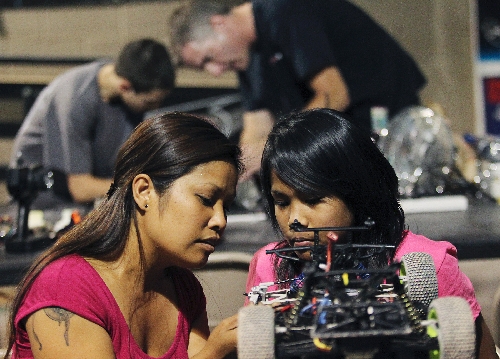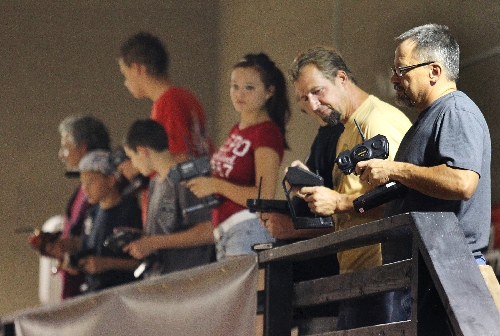Scaled-down RC cars almost like racing real thing
Think of it this way: If the radio-controlled cars zipping around the dirt track at The Vegas RC Raceway had little, tiny drivers behind the wheel ... well, that would be so cool.
But it also would mean that those little, tiny drivers would be driving cars that, based on the cars' scale, would be zipping around that track at speeds of well more than 200 mph. And that's pretty cool, too.
Actually, when Eric Flinn and his wife, Amber Pierce, opened The Vegas RC Raceway, 3420 N. Rancho Drive, No. 110, in January, their goal was simply to "do something fun, and we wanted to give a little something back to the community," Flinn says.
But, it turns out, opening the track also has provided a vehicle (excuse the pun) for parents and kids to enjoy some quality time together by participating in a fast and exciting hobby that can be fairly inexpensive.
While it's not the only place in town where hobbyists can race radio-controlled cars, Flinn says he and his wife wanted to open a venue near the northwest part of the valley that caters to families. The indoor off-road track features a tight succession of jumps, curves and straightaways. But what makes the track distinctive, according to Flinn, is that it's made of pure clay imported from Pennsylvania.
"We're one of two tracks in the country that's pure clay," he says.
The all-clay racing surface, which enables the cars to gain a better grip on the track and improve performance, cost about $50,000, Flinn says, "but we've gotten quite a name for ourself using it."
Flinn, now 31, was introduced to RC car racing at a now-gone local track when he was about 10 years old. But he always has "kept an eye" on the sport, which, he notes, is "very popular" in California and other parts of the country.
But, Flinn says, "in Vegas it was always a struggle. I just thought I had something to offer the sport and figured I could do it better."
On a recent weekday evening, eight drivers race their electric cars around the track using handheld, pistol-like transmitters. To control the cars' speed, drivers manipulate a trigger on the transmitter, while they steer the cars by working a wheel on its side.
The cars zip around the track, whispering soft whines as they round the corners. When cars inevitably flip because of steering or acceleration miscues, drivers run onto the track to right them, illustrating why RC car racing is less expensive -- and, for drivers, less fatal -- than full-sized car racing.
Flinn says the hobby attracts a wide demographic that he tries to encourage, particularly those new to the sport. "Here, everybody helps out. Our main goal is to make the hobby as big as possible in Las Vegas."
On this night, spectators and drivers include men, women and kids, while, in the pit area, Zak Wilcox and his 10-year-old son, Blake, join other drivers in tuning up their vehicles. Wilcox, 38, says his dad and uncle introduced him to slot cars when he was a kid and that he transitioned into RC racing after seeing radio-controlled cars in a hobby shop.
Wilcox says racing RC cars is an activity that he and his son can enjoy together. Blake, meanwhile, likes "how competitive it is. It's just really fun and exciting."
"I like him to see the ups and downs of competitiveness," Wilcox says. "He's learning that losing isn't everything and you'll get them back next week, and try a little harder (and spend) a little more time and a little more practice."
Joe White and his 10-year-old son, Max, are relative newcomers to the hobby, having gotten involved in it a little more than four months ago.
Racing is "something my boys and I can do together," White says. For Max, the appeal of RC car racing is that "I'm getting to spend time with my family, and it's a lot of fun driving and meeting the other drivers."
Even Lila Flinn, 13, likes RC racing, which at least makes helping to run the family business more fun than it might have been otherwise.
Dad/track owner Eric Flinn "got me into it," she says. "It was like two years ago when we first started. It's a lot of fun.
"Now I'm learning how to fix and repair the cars. I'm learning how to go real fast and not wreck, and I actually love it."
Eric Flinn says beginners can buy a new hobby-grade RC car -- the customizable variety of radio-controlled car a step above the type sold in toy and electronic stores -- for about $250 to $350, while experienced racers can choose to pay as much as $2,500 or $3,000 for a car and equipment.
Another option: "We bought a lot of our stuff off of craigslist," Wilcox says. "People who are getting out of the hobby tend to sell it in bulk."
Still another option: Cars can be rented for $15 at The Vegas RC Raceway. After that, it'll cost $15 to practice, $20 to enter a race. Or, with a $30 annual membership, those prices drop to $10 to practice and $15 to race and $10 to rent a car.
Races take place each Saturday at 4 p.m., Flinn says, "and we get anywhere from 50 to 100 people" each session. However, drivers, be they veterans or newcomers, can practice on the track daily from 10 a.m. to 11 p.m.
For RC car drivers, as for enthusiasts of full-sized cars, part of the fun is souping up their cars between races and practice runs to make them run just a bit faster. Flinn says RC car drivers can match cars to particular tracks and their own driving styles by, for example, altering a car's suspension or switching out tires.
Technically speaking, "it's just like full-size racing in every aspect," he says.
In fact, White jokes, "you do more working on them than you do driving. It's five minutes' driving time and a few hours just to (carve off) that extra second or half-second."
Shane Lyon began RC car racing at 18 and competes in races mostly throughout the West. But, when he was younger, Lyon also raced motocross until injuries put an end to that.
Racing RC cars "gives me the same feeling" as motocross, he says, except that "I don't get hurt."
But, for Lyon, who also serves as track designer and team manager at the raceway, "the coolest part" of RC car racing is "getting to see some of these little kids on the (drivers') stand. The first time, they're all over the place, crashing and breaking stuff. Then you see them start to progress."
For fans who love it, RC car racing "is pretty much an addiction," Lyon says. "Once (they) get on the track and see that you can go so fast and put down a pretty good lap, they get addicted to it."
Contact reporter John Przybys at jprzybys@review journal.com or 702-383-0280.

















